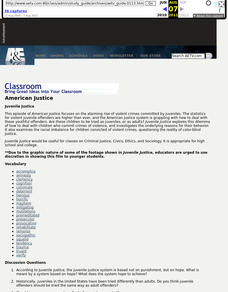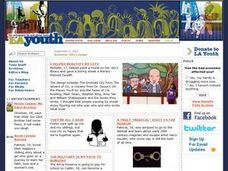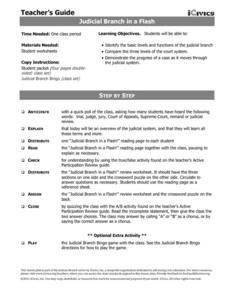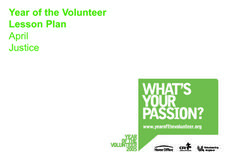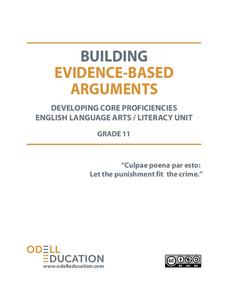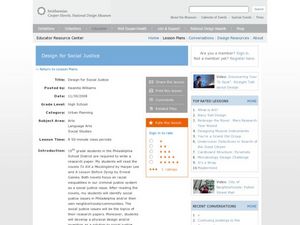Curated OER
American Justice: Juvenile Justice
Students watch a video that focuses on the alarming rise of violent crimes committed by juveniles. They see how the American justice system dealsl with these youthful offenders. They examine racial imbalance and color-blind justice.
Curated OER
Opening Eyes, Changing Minds. Talking About Personal Transformation And the Development of World Views
Young scholars read one teen's story of personal growth through learning about racism and the criminal justice system to explore how individuals' world views are shaped and changed through experiences and education.
Curated OER
Indiana Courts: How Do They Work?
Students identify the branches of Indiana's judicial system and determine the differences between the different courts and different types of cases. Students create a flow chart showing how a court case works its way through the legal...
iCivics
Judicial Branch in a Flash
What is the difference between the federal court and state court systems? What about criminal versus civil cases? Check out this resource that will offer your class members a general and effective overview of the judicial branch in the...
Curated OER
Justice
Students consider the role of justice in the formation of the United States and in the operation of today's criminal justice system. They investigate symbols associated with justice and references to justice in the Constitution.
Judicial Learning Center
Types of Court Cases
How can one court acquit someone of a crime, while another convicts the person of the same one? It's all because of the differences between civil and criminal trials. An informative resource provides scholars in the field of criminology...
Curated OER
You and the Judicial System
Learners explore how the structure of the state and federal judicial systems affect them. They select an appropriate media and create a presentation on the structure of the judicial system, the criminal judicial system and a guide to the...
Curated OER
Trying Teens
Learners explore the court cases and legal organizations that were instrumental in creating a system of juvenile justice in the United States, then present their findings in a composite timeline.
Curated OER
You and the Law -- Beating the Odds
Middle schoolers examine the rate of institutional racism in the United States. Individually, they write in their journals about how they can make better choices and increase their self-esteem. Using historical documents, they identify...
Curated OER
Juvenile Justice - Consequences Of Offenses To Offenders, Victims, And Community
Young scholars learn of the consequences of juvenile crime and how the state of Washington includes victims in the juvenile justice process.
BBC
Crime
Crime and punishment! Learners discuss the law, civics, and crime in the UK. They brainstorm lists of crimes and possible punishments, complete activities on a website, role-play a Juvenile Court scenario, and try to think of ways they...
Odell Education
Building Evidence-Based Arguments: "Cuplae poena par esto: Let the punishment fit the crime."
Should a criminal's punishment match the crime? An argumentative writing plan explores this question as class members investigate a variety of mixed-medium sources by experts in the field, form evidence-based claims, and support them...
Curated OER
Damilola Taylor: Young people in court
Students read the story, "The scene in the courtroom" then discuss a list of questions. They look at the criminal court system, and design their own user-friendly courtroom.
Curated OER
Laws...Who Needs Them?
Who needs laws? Junior high schoolers sure do! Provide your 7th-9th graders with an understandng about why laws are important and how they are used to create a functioning society. Learners use a series of handouts and readings to build...
Curated OER
The Leed's footballers' trial
Students explore what happens when someone is tried for a crime. They expand their knowledge of the name "Criminal Justice System" and develop discussion skills. Students read the story Leeds footballer guilty of fighting in public. ...
Curated OER
Law in the Future
Learners develop a legal system. In this justice system lesson, students examine case law in the Untied States and draw on that experience to create a legal system for a "moon colony" which integrates the legal systems on Earth.
Curated OER
Rules and Laws
Students investigate the difference between rules and laws. For this justice system lesson, students discuss the presence of rules of their lives and compare them the "Code of the West."
Curated OER
Design for Social Justice
Students create a solution to a social justice problem within their community. In this urban planning lesson, students read To Kill a Mockingbird by Harper Lee and A Lesson Before Dying by Ernest Gaines. Students then complete a research...
Judicial Learning Center
Levels of the Federal Courts
The Supreme Court gets all the glory, but very few federal cases make it to the highest court. An interesting lesson explores the structure of the lower levels of the federal court system. In addition to outlining the organization of...
Curated OER
Science in the Court Room
Share their opinions on the use of DNA databases in criminal investigations. After reading an article, they evaluate the pros and cons of the databases and work in groups to answer discussion questions. They write a letter to a state...
ConnectED
Crime Scene Investigation
How exactly does a crime scene investigation work? The resource, a unit on criminology, covers everything from the deductive reasoning skills needed for detectives to DNA fingerprinting, all the way to how to gather evidence and bring...
Judicial Learning Center
Judicial Independence
Most people support the idea of an independent judiciary in theory until they hear about a court case that violates their principles. An informative resource explains why the concept is important. It also provides scholars of criminology...
Judicial Learning Center
Getting Ready for Trial
A courtroom can be a scary place for the uninitiated. Get familiar with the process using a helpful overview of the activities that take place prior to both civil and criminal cases. The lesson explains the differences between...
Teaching Tolerance
Understanding the Prison Label
Break the chain. An engaging lesson examines why it is so hard to break free of the prison system in the US. Academics participate in a reader's theater, read primary sources, and discuss their thoughts. The lesson explains the hardships...


